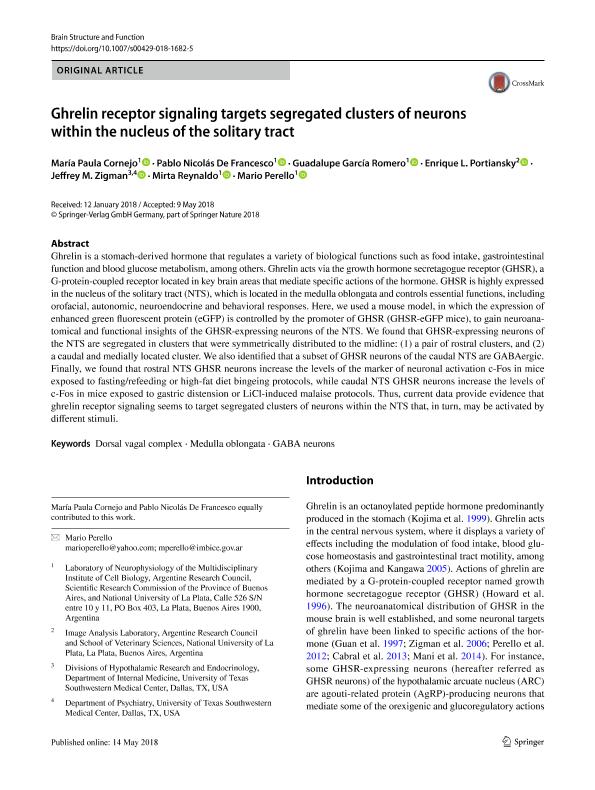Artículo
Ghrelin receptor signaling targets segregated clusters of neurons within the nucleus of the solitary tract
Cornejo, María Paula ; de Francesco, Pablo Nicolás
; de Francesco, Pablo Nicolás ; Garcia Romero, Guadalupe
; Garcia Romero, Guadalupe ; Portiansky, Enrique Leo
; Portiansky, Enrique Leo ; Zigman, Jeffrey M.; Reynaldo, Mirta Beatriz; Perello, Mario
; Zigman, Jeffrey M.; Reynaldo, Mirta Beatriz; Perello, Mario
 ; de Francesco, Pablo Nicolás
; de Francesco, Pablo Nicolás ; Garcia Romero, Guadalupe
; Garcia Romero, Guadalupe ; Portiansky, Enrique Leo
; Portiansky, Enrique Leo ; Zigman, Jeffrey M.; Reynaldo, Mirta Beatriz; Perello, Mario
; Zigman, Jeffrey M.; Reynaldo, Mirta Beatriz; Perello, Mario
Fecha de publicación:
09/2018
Editorial:
Springer Heidelberg
Revista:
Brain Structure & Function
ISSN:
1863-2653
Idioma:
Inglés
Tipo de recurso:
Artículo publicado
Clasificación temática:
Resumen
Ghrelin is a stomach-derived hormone that regulates a variety of biological functions such as food intake, gastrointestinal function and blood glucose metabolism, among others. Ghrelin acts via the growth hormone secretagogue receptor (GHSR), a G-protein-coupled receptor located in key brain areas that mediate specific actions of the hormone. GHSR is highly expressed in the nucleus of the solitary tract (NTS), which is located in the medulla oblongata and controls essential functions, including orofacial, autonomic, neuroendocrine and behavioral responses. Here, we used a mouse model, in which the expression of enhanced green fluorescent protein (eGFP) is controlled by the promoter of GHSR (GHSR-eGFP mice), to gain neuroanatomical and functional insights of the GHSR-expressing neurons of the NTS. We found that GHSR-expressing neurons of the NTS are segregated in clusters that were symmetrically distributed to the midline: (1) a pair of rostral clusters, and (2) a caudal and medially located cluster. We also identified that a subset of GHSR neurons of the caudal NTS are GABAergic. Finally, we found that rostral NTS GHSR neurons increase the levels of the marker of neuronal activation c-Fos in mice exposed to fasting/refeeding or high-fat diet bingeing protocols, while caudal NTS GHSR neurons increase the levels of c-Fos in mice exposed to gastric distension or LiCl-induced malaise protocols. Thus, current data provide evidence that ghrelin receptor signaling seems to target segregated clusters of neurons within the NTS that, in turn, may be activated by different stimuli.
Palabras clave:
DORSAL VAGAL COMPLEX
,
GABA NEURONS
,
MEDULLA OBLONGATA
Archivos asociados
Licencia
Identificadores
Colecciones
Articulos(IMBICE)
Articulos de INST.MULTIDISCIPL.DE BIOLOGIA CELULAR (I)
Articulos de INST.MULTIDISCIPL.DE BIOLOGIA CELULAR (I)
Citación
Cornejo, María Paula; de Francesco, Pablo Nicolás; Garcia Romero, Guadalupe; Portiansky, Enrique Leo; Zigman, Jeffrey M.; et al.; Ghrelin receptor signaling targets segregated clusters of neurons within the nucleus of the solitary tract; Springer Heidelberg; Brain Structure & Function; 223; 7; 9-2018; 3133-3147
Compartir
Altmétricas



